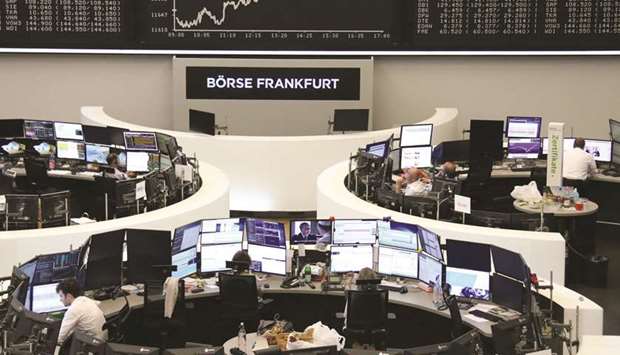Global stock markets mostly rose yesterday on hopes a trade war will be avoided following the G7 summit in Biarritz, but China’s yuan currency nevertheless slumped to a new 11.5-year low.
Frankfurt and Paris shares advanced solidly, though London dipped as Brexit-weary British investors – who at least took in a one-month high for sagging sterling against the dollar – played catch-up after a three-day holiday weekend.
London’s FTSE 100 was down 0.1% to 7,089.58 points, Frankfurt’s DAX 30 rose 0.6% to 11,730.02 and Paris’s CAC 40 gained 0.7% to 5,387.09 points at the close yesterday.
Asian equities mainly gained, recovering from the previous day’s pounding after President Donald Trump said China-US trade talks would resume soon.
Wall Street was a touch firmer as a more positive trade talk vibe took hold.
China’s beleaguered yuan nosedived in morning yesterday deals to 7.1722 yuan to the dollar – a level last seen in 2008.
The unit had already plunged Monday on weekend news that Washington would hike tariffs on more than half-a-trillion dollars of Chinese imports, after Beijing unveiled levies on tens of billions of dollars of US goods.
“It’s been a rollercoaster ride of trade war sentiment over the last few months and it seems traders have now entered into a state of confusion at where things actually currently stand,” said analyst Craig Erlam at trading firm Oanda.
Erlam warned that Trump was sending out “mixed messages” after the US leader said at a G7 news conference in France that negotiations would resume very soon and Beijing had telephoned saying it wanted to strike a deal during talks which he said were “more meaningful than at any time”.
“What is clear when looking past all the noise is that tariffs barriers on both sides have increased or will shortly do so, and investors need to focus on what Trump does and less on what he says,” said Michael Hewson, chief market analyst at CMC Markets UK.
Capital Economics said one view of the situation was that “investors are still clinging to hopes that the US and/or China is bluffing, and that the trade war will blow over.”
But the consultancy warned that “that view scarcely looks credible anymore, given how both sides have doubled down recently.
Further escalation seems a much more likely outcome.”
In commodities, oil prices rose after Trump said he was prepared to meet Iran’s Hassan Rouhani in the next few weeks, following talks over Tehran’s nuclear programme at the G7 summit.
“Expectations are... rising that tensions in the Gulf can be de-escalated following President Macron’s overtures to broker a meeting between Donald Trump and his Iranian counterpart,” noted AxiTrader analyst James Hughes.
Back in Europe, talk of recession resumed after final German GDP data confirmed that the continent’s top economy contracted in the second quarter, with many saying it could easily do so again in the third.
“Given that other data points for Germany in Q3 have been weak there’s every chance that we see another contraction and satisfy the definition of a technical recession,” said David Cheetham at XTB.
Meanwhile, the British pound rose yesterday as opposition parties vowed to try and pass a law to prevent a no-deal Brexit at the end of October, encouraging traders to buy sterling even though most fear the country is headed for a disorderly exit from the EU.
Parliament returns from its summer break next week and is preparing for a battle with Prime Minister Boris Johnson, who has pledged to take Britain out of the European Union on October 31, with or without an exit agreement.
Labour leader Jeremy Corbyn yesterday hosted talks with other opposition parties and they agreed to try and stop a no-deal Brexit, including through passing legislation that would force Johnson to seek a delay to Brexit.
The pound extended its earlier gains after the statement.
Sterling rose more than 0.7% on the day to hit as high as $1.2310, its strongest since July 29, before giving up some of those gains to trade at $1.2259.
The British currency also hit a one-month high versus the euro at 90.17 pence, before steadying at 90.58 pence per euro.
Investors are growing increasingly concerned that Britain is headed towards a no-deal Brexit on October 31 that could disrupt trade flows and weaken the economy, though some also believe the currency has moved too far downwards.
“We are slightly positive on sterling in our portfolios as we think that a hard Brexit is already priced into the markets,” said Ugo Lancioni, managing director of global fixed income and currency management at Neuberger Berman.

The DAX graph is seen at the Frankfurt Stock Exchange. The DAX 30 rose 0.6% to 11,730.02 points yesterday.
